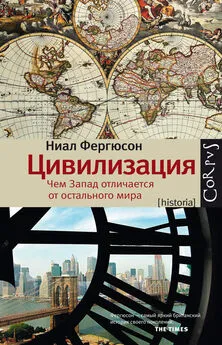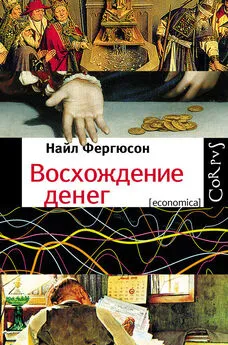Ниал Фергюсон - Великое вырождение. Как разрушаются институты и гибнут государства
- Название:Великое вырождение. Как разрушаются институты и гибнут государства
- Автор:
- Жанр:
- Издательство:Литагент Corpus
- Год:2016
- Город:Москва
- ISBN:978-5-17-091608-5
- Рейтинг:
- Избранное:Добавить в избранное
-
Отзывы:
-
Ваша оценка:
Ниал Фергюсон - Великое вырождение. Как разрушаются институты и гибнут государства краткое содержание
Великое вырождение. Как разрушаются институты и гибнут государства - читать онлайн бесплатно полную версию (весь текст целиком)
Интервал:
Закладка:
14
В будущей работе о “духе общего права” мы с Чарльзом Беаром подробно проанализируем ход его эволюции исходя из постепенного изменения значения правовых концепций (вместо функционалистского, ограниченного сегодняшним днем подхода, свойственного Шлейферу и его коллегам).
15
Присутствие в списке Ирана служит напоминанием, что пользоваться такими материалами следует с осторожностью.
16
Перевод М. Лозинского. – Прим. перев.
17
Ланселот Браун (1716–1783) – английский ландшафтный архитектор. Прозван современниками “Капабилити” за то, что убеждал состоятельных клиентов в огромном потенциале ( great capabilities ) их угодий для воплощения собственных представлений о прекрасном. – Прим. перев .
18
Перевод И. Малаховой. – Прим. перев.
19
Перевод В. Олейника. – Прим. перев.
20
Перевод В. Олейника. – Прим. перев.
21
Перевод Б. Ворожцова. – Прим. перев .
22
Перевод В. Олейника. – Прим. перев .
23
Строго говоря, колледж Св. Магдалины входит в состав университета с государственным финансированием, на независимость которого правительство время от времени покушается. При этом указанный колледж сохраняет самоуправление и собственный эндаумент.
24
Уэст пишет: “Одна из неприятных сторон неограниченного роста, скорость которого увеличивается более чем экспоненциально, – та, что неограниченный рост ведет к коллапсу… Это обосновывается математически, с помощью понятия сингулярности ( finite time singularity ). Вы попадаете в точку сингулярности… и система… схлопывается”.
25
Выражение Рэя Далио, управляющего американским хеджевым фондом “Бриджуотер”, который исключительно успешно действовал во время финансового кризиса.
Комментарии
1
Fukuyama, Francis The End of History and the Last Man // National Interest, 16 (Summer 1989): 3–18.
2
McKinsey Global Institute Urban World: Cities and the Rise of the Consuming Class . June 2012.
3
McKinsey Global Institute Debt and Deleveraging: The Global Credit Bubble and its Economic Consequences . January 2010.
4
Berezin, Peter The Weak U.S. Labor Market: Mainly a Cyclical Problem… for Now // Bank Credit Analyst, 64, 1 (July 2012): 40.
5
См. например: Sachs, Jeffrey The Price of Civilization: Reawakening American Virtue and Prosperity . New York, 2011.
6
См. например: International Monetary Fund Navigating the Fiscal Challenges Ahead // Fiscal Monitor, 14 May 2010.
7
Atkinson, Anthony B., Piketty, Thomas, and Emmanuel Saez Top Incomes in the Long Run of History // Journal of Economic Literature, 49, 1 (2011): 3–71.
8
Credit Suisse Global Wealth Databook . October 2010. Tables 3–1, 3–3, 3–4.
9
См.: Baz, Jamil Current Crisis Merely a Warm up Act // Financial Times, 11 July 2012.
10
Ferguson, Niall Too Big to Live: Why We Must Stamp Out State Monopoly Capitalism // Adam Smith Review, 6 (2011): 327–340.
11
Enriquez, Juan Medicine’s Missing Measure // Atlantic (May 2012). См.: http://www.theatlantic.com/health/archive/ 2012/05 /medicines-missing-measure/ 257901/.
12
Stossel, John I Tried to Open a Lemonade Stand // Townhall, 24 February 2012.
13
Hertz, Tom Rags, Riches, and Race: Intergenerational Income Mobility of Black and White Families in the United States / In: Bowles, Samuel, Gintis, Herbert, and Melissa Osborne, eds. Unequal Chances: Family Background and Economic Success . New York, 2005. Table 10.
14
Murray, Charles Coming Apart: The State of White America, 1960–2010. New York, 2012.
15
Smith, Adam The Wealth of Nations (1776). Book I, ch. 8.
16
Ibid. Ch. 9.
17
См.: http://blog.lgiu.org.uk/ 2011/09 /on-libya-andinstitutions/ . Благодарю Лорда Маллох-Брауна за то, что обратил внимание на граффити в программе “Сегодня” на BBC Radio 4.
18
См.: Acemoglu, Daron, and James A. Robinson Why Nations Fail: The Origins of Power, Prosperity, and Poverty . New York, 2012.
19
Taverner, Richard The Garden of Wysdome Conteynynge Pleasaunt Floures, that is to say, Propre and Quycke Sayinges of Princes, Philosophers and other Sortes of Me[n]. Drawe[n] Forth of Good Aucthours . London, 1539, p. 6.
20
Данные из: Maddison, Angus Statistics on World Population, GDP and Per Capita GDP, 1—2008 AD . См.: http://www.ggdc.net/MADDISON/Historical_Statistics/ vertical-file_ 02—2010 .xls .
21
Данные Всемирного банка. См.: http://data.worldbank.org/data-catalog/world-developmentindicators .
22
Diamond, Jared Guns, Germs and Steel: A Short History of Everybody for the Last 13,000 Years . London, 1998. [Рус. пер.: Даймонд Д. Ружья, микробы и сталь: судьбы человеческих обществ . М.: АСТ: Corpus, 2010.] Также см.: Morris, Ian Why the West Rules – For Now: The Patterns of History, and What They Reveal About the Future . New York, 2010.
23
Pomeranz, Kenneth The Great Divergence: China, Europe and the Making of the Modern World Economy . Princeton, 2000.
24
North, Douglass C., Wallis, John Joseph, and Barry R. Weingast Violence and Social Orders: A Conceptual Framework for Interpreting Recorded Human History . Cambridge, 2009.
25
Fukuyama, Francis The Origins of Political Order: From Prehuman Times to the French Revolution . New York, 2011.
26
Acemoglu, Daron, and James A. Robinson Why Nations Fail: The Origins of Power, Prosperity, and Poverty . New York, 2012. P. 4.
27
Ibid. Pp. 7–9.
28
Collier, Paul The Bottom Billion . Oxford, 2007. Pp. 50, 56; Collier, Paul The Plundered Planet: How to Reconcile Prosperity with Nature . London, 2010. Pp. 47f., 58.
29
Soto, Hernando de The Mystery of Capital: Why Capitalism Triumphs in the West and Fails Everywhere Else . New York, 2000.
30
Soto, Hernando de The Free Market Secret of the Arab Revolutions // Financial Times, 8 November 2011.
31
Clark, J. C.D. British America: What If There Had Been No American Revolution? / In: Niall Ferguson, ed. Virtual History: Alternatives and Counterfactuals . London, 1993. Pp. 125–175.
32
Например см.: Jones, J.R. The Revolution in Context / In: J.R. Jones, ed. Liberty Secured? Britain before and after 1688. Stanford, 1992. P. 12.
33
Pincus, Stephen C.A., and James A. Robinson What Really Happened during the Glorious Revolution? // National Bureau of Economic Research Working Paper 17206 (July 2011).
34
Greif, Avner Institutions and the Path to the Modern Economy: Lessons from Medieval Trade / In: Ménard, C., and M. Shirley, eds. Handbook of New Institutional Economics . Dordrecht, 2005. Pp. 727–786.
35
Kuran, Timur The Long Divergence: How Islamic Law Held Back the Middle East . Princeton, 2010.
36
OECD PISA 2009 Results: What Students Know and Can Do: Student Performance in Reading, Mathematics and Science . Paris, 2010. P. 15. См.: http://www.oecd.org/dataoecd/ 10/61/48852548 .pdf .
37
Ferguson, Niall Civilization: The West and the Rest. London/New York , 2011. [Рус. пер.: Фергюсон Ниал. Цивилизация: чем Запад отличается от остального мира. М.: АСТ: Corpus, 2014.]
38
Allen, Robert C. The British Industrial Revolution in Global Perspective . Cambridge, 2009.
39
North, Douglass C., and Barry R. Weingast Constitutions and Commitment: The Evolution of Institutions Governing Public Choice in Seventeenth-Century England // Journal of Economic History, 44, 4 (1989): 803–832.
40
Kotlikoff, Laurence J., and Scott Burns The Clash of Generations: Saving Ourselves, our Kids, and our Economy . Cambridge, MA, 2012. P. 33.
41
Ibid. Pp. 30f.
42
Cardarelli, Roberto, Sefton, James, and Laurence J. Kotlikoff Generational Accounting in the UK // Economic Journal, 110, 467, Features (November 2000): F547–F574.
43
Reinhart, Carmen M., and Kenneth S. Rogoff Growth in a Time of Debt . NBER Working Paper 15639 (January 2010).
44
См.: Krugman, Paul Reagan Did It // New York Times, 31 May 2009.
45
Krugman, Paul Financial Reform 101 // New York Times, 1 April 2010. Также см.: Krugman, Paul Punks and Plutocrats // New York Times, 28 March 2010.
Читать дальшеИнтервал:
Закладка:
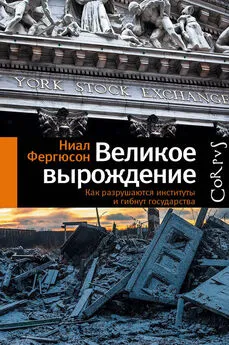
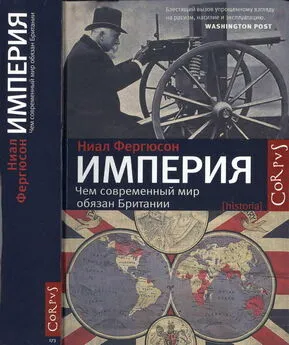



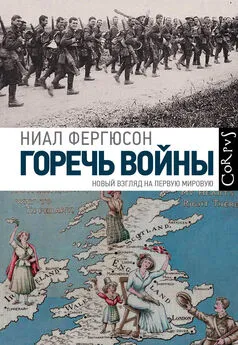
![Ниал Фергюсон - Площадь и башня [Cети и власть от масонов до Facebook]](/books/1070896/nial-fergyuson-plochad-i-bashnya-ceti-i-vlast-ot-ma.webp)

